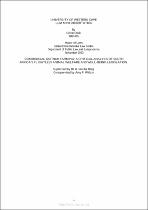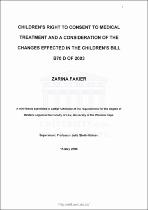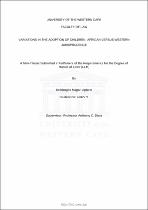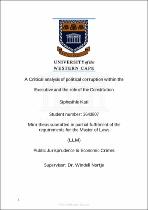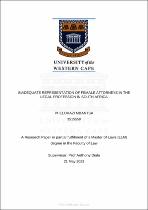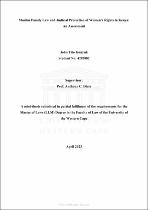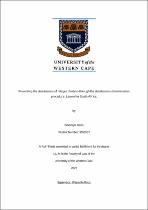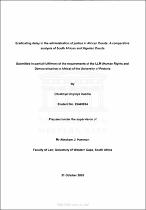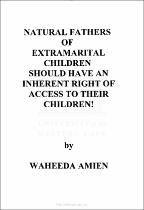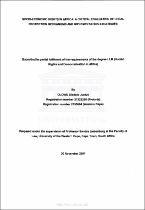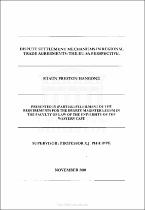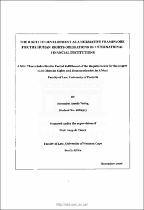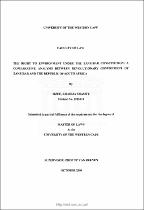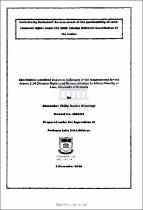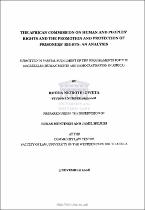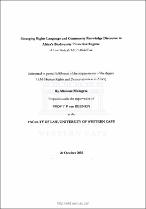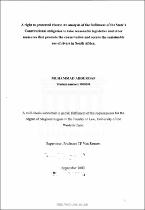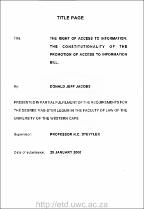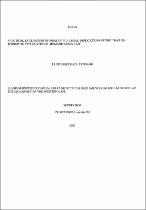Department of Public Law and Jurisprudence
Browse by
The Department of Public Law and Jurisprudence prides itself on the extensive variety of courses it offers, both at undergraduate and postgraduate level, as well as its strong record of high quality research. In addition to the courses that are traditionally regarded as falling within public law and jurisprudence the Department presents a diverse menu of elective courses including, among others, Advanced Public Law, Environmental law, Gender Law, Immigration and Refugee Law, and the South African Bill of Rights.
Collections in this community
Recent Submissions
-
Commercial ostrich farming: a critical analysis of South Africa’s flightless animal welfare and well-being legislation
(University of the Western Cape, 2023)Game farming is becoming an increasingly lucrative industry. The owning of game animals and farms has been around for decades and has increased significantly. This situation is illustrated by the fact that in 2019 there ... -
Children's right to consent to medical treatment and a consideration of the changes effected in the Children's Bill B70 D of 2003
(University of the Western Cape, 2006)Children's rights to consent to medical treatment and the balancing of parental rights have become the focus of much debate in South Africa over the last few decades. Issues concerning the age at which children can consent ... -
Variations in the adoption of children: African versus Western Jurisprudence
(2024)During the colonial era, South Africa's indigenous normative order was subjugated by European laws, which led to a distortion of indigenous laws and the perception that Western jurisprudence was the supreme law. However, ... -
A critical analysis of political corruption within the executive and the role of the constitution
(University of the Western Cape, 2023)The achievement of constitutionalism in South Africa is often applauded for its pivotal liberation that it laid upon individuals through bureaucracy, human rights, institutionalism, and moral science. However, there should ... -
Inadequate representation of female attorneys in the legal profession in South Africa
(University of the Western Cape, 2023)Female law graduates have significantly increased in South Africa over the past few decades. Yet, female attorneys are still underrepresented in the legal profession. Historically, men have dominated the legal profession ... -
Muslim family law and judicial protection of women’s rights in Kenya: an assessment
(University of the Western Cape, 2023)The status of women in Muslim majority and minority states is a major question in the articulation of rights in non-Western settings. Contestations over women’s rights in these societies are thought to stem from conundrums ... -
Preventing the statelessness of refugee children through the statelessness determination procedure: Lesson for South Africa
(University of the Western Cape, 2022)By exploring the different causes of childhood statelessness in displaced children on a global scale, this thesis aims to highlight the urgent need to end childhood statelessness. The importance of statelessness determination ... -
Eradicating delay in the administration of justice in African courts : a comparative analysis of South African and Nigerian courts
(University of the Western Cape, 2005)A well functioning judiciary is a central element of civil society. It is the sole adjudicator over the political, social and economic spheres. Judiciaries in many African countries suffer from backlogs, delays and corruption. ... -
Natural fathers of extramarital children should have an inherent right of access to their children!
(University of the Western Cape, 1991)The story which I am about to relate is a true one. However, to protect the privacy of the parties concerned, their names have been changed. I have a friend called Bob. Bob is the biological father of a five-year-old girl ... -
Socio-economic rights in Africa: a critical evaluation of legal protection mechanisms and Implementation strategies
(University of the Western Cape, 2001)There is an emerging broad consensus that civil and political rights on the one hand, and socio-economic rights on the other, are ingenerated and indivisible. Taken together, they embody the cardinal norms which inform ... -
Dispute settlement mechanisms in regional trade agreements: the EU-SA perspective
(University of the Western Cape, 2001)This paper shall attempt to define and explain the various forms of dispute settlement in regional trade agreements. Trade Agreements from various continents as well as the World Trade Organisation will be scrutinised. The ... -
The right to development as a normative framework For the human rights obligations of international financial institutions
(University of the Western Cape, 2008)Human rights are the product of different stages of human struggle that took place throughout history. The advent of the right to development in the international arena is part of the result of the struggle of developing ... -
The right to environment under the Zanzibar constitution : a comparative analysis between revolutionary government of Zanzibar and the Republic of South Africa
(University of the Western Cape, 2009)There are practical linkages between the respective causes of human rights and environmental protection since environmental harms and human rights abuses often go together. Moreover, threats to environment can themselves ... -
Inclusion by exclusion? an assessment on justiciability of socio-economic rights under the 2005 interim national constitution of the sudan
(University of the Western Cape, 2008)This research is an attempt to ascertain whether or not socio-economic rights provided for in the International Covenant on Economic, Social and Cultural Rights(CESCR), ( and by implication all other international human ... -
The african commission on human and peoples' rights and the promotion and protection of prisoners, rights an analysis
(University of the Western Cape, 2008)There is an estimated one million prisoners in Africa and most of them are detained in overcrowded prisons and conditions that well below internationally accepted standards.'These prisons hold both sentenced prisoners ... -
Emerging, rights language and community knowledge discourse in Africa's biodiversity protection regime : a case study of OAU's Model Law
(University of the Western Cape, 2002)Africa possesses huge amounts of genetic resources and traditional knowledge that sustain diverse small economies and local livelihood. The integrity of this natural wealth and cultural Pattern, however, is being seriously ... -
A right to protected rivers: An analysis of the fulfilment of the State's Constitutional obligation to take reasonable legislative and other measures that promote the conservation and secure the sustainable use of rivers in South Africa.
(University of the Western Cape, 2003)This mini-thesis deals with the right to protected rivers whereby it analyses the fulfilment of the State's Constitutional obligation to take reasonable legislative and other measures that promote the conservation and ... -
The right of access to information: The Constitutionality of the promotion of access to information bill
(2000)The Constitution of the Republic of South Africa ("the Constitution") as well as its precursor ("the interim Constitution") 2entrench the right of access to information. ln the Constitution the right of access to information ... -
A critical evaluation of some of the legal implications of the "war on Terror'' in international humanitarian law.
(University of the Western Cape, 2007)It would have been ideal to begin a mini-thesis of this nature with a definition of the term terrorism. This approach will however not be taken for three reasons. Firstly, there are disagreements inherent in the definition ... -
The limitation of fundamental rights
(University of the Western Cape, 1999)South Africa's new Constitution has been hailed as one of the most democratic and sophisticated in history, surpassing even the Constitutions of many first world countries. Of paramount importance in the Constitution is ...

